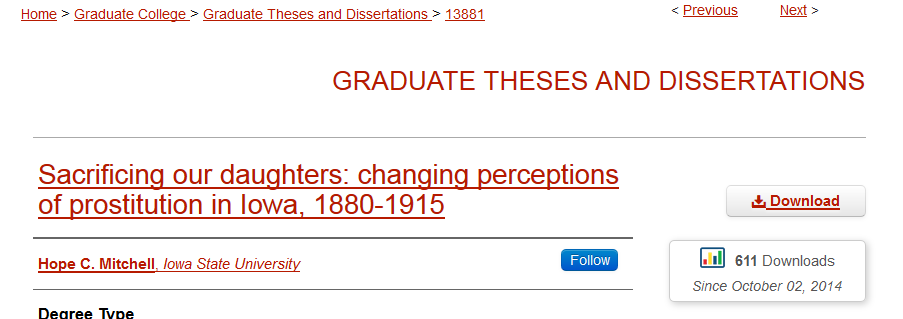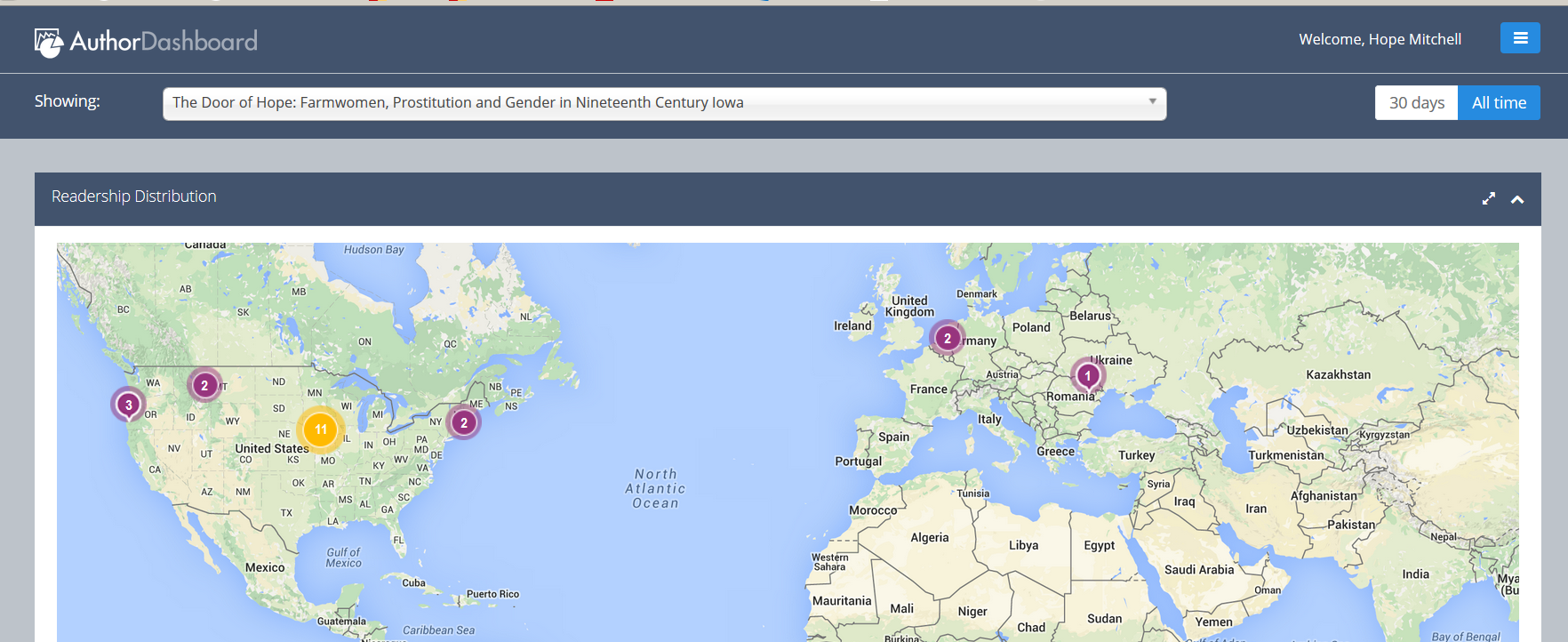Something Old, Something New: Merging Historical Research with Modern Concepts of Sharing
Hope Mitchell, Iowa State University
Reading through past RWSA blog posts, I was really intrigued by both Jenny Barker-Devine & Cynthia Prescott’s posts about the ways in which they are taking advantage of new technologies and platforms in order to not only further their research, but also to make it more accessible. After graduating from Iowa State University with my M.A. in History, I knew that a job in academia was not for me. Instead I took a position at Iowa State’s library as their Digital Repository Specialist. This left me plenty of time to pursue my one true passion by night: prostitution, more specifically the study of prostitution in the nineteenth century Midwest. While I love my prostitutes of the past and could talk about them endlessly, this blog post is not actually about prostitution. Instead, it is about ways in which I utilized technological resources provided by our institutional repository to make my research accessible to readers around the world which has ultimately benefited me in ways I never could have imagined.
In my current position as the Digital Repository Specialist at Parks Library, I help faculty members from across campus make their works available through our repository. This entails a lot of reading through copyright transfer agreements, publisher’s policies, negotiating permissions on behalf of our authors and coming up with creative ways to display and share the broad range of scholarly outputs our faculty produce. Additionally, I am also expected to practice what I preach, so when my thesis was digitized and I was sure that I had no immediate plans to publish it, I choose to make it available through the repository. Little did I know that one simple action would open me up to a whole slew of exciting opportunities, both big and small.
Okay, let’s start with the big opportunities. Since making my research available through our repository, I have not only been approached by editors to produce articles for their journals, but also by publishers who are interested in converting parts of my thesis into a larger volume and even a screen writer from Los Angeles who is potentially interested in putting together a documentary about the history of prostitution in Des Moines. Granted, some of these offers most certainly came from vanity publishers, but many of them were legitimate professionals interested in my research. By making my scholarship available through our repository, and with little to no effort on my part, my research was able to reach a broad range of interested parties. As a result, I have just recently submitted the final copy of my manuscript for a book about a historic neighborhood in Des Moines that was once rife with prostitution and am also in the process of putting together an article for the Annals of Iowa. Could I have achieved these successes without our repository? Maybe, but I certainly would have had to work a lot harder to make people aware of my research.

Among the smaller successes I attribute to the access our repository has provided to my research are the countless individuals who have reached out to me with their own personal stories about the ways in which prostitution shaped their families. While these stories are not only interesting and helpful for my future research, they also feel like a major victory. When I began my research on the history of prostitution in Iowa so many people told me that I wasn’t going to find anything because, “we didn’t have [prostitution] in Iowa.” Boy, were they wrong! After sharing my thesis through our repository, I waited for what I assumed would be the inevitable backlash and few months ago it seemed as if it had finally arrived. I received an email from a woman in Oregon with the subject line, “My Ancestor is in your Dissertation…” I braced myself for a serious lashing, assuming that this reader was going to tear me apart for dragging up some old shameful family history. You see, I referenced several court cases in my thesis about a woman named Maggie. During her trail, many concerned citizens complained that Maggie’s brothel was not just a nuisance to the community, but was also a danger to the children she was raising there. One of those children was the great-great grandmother of the woman who emailed me. Rather than being ashamed of Maggie’s wild ways, she was actually thrilled to gain greater insight into her family history. I was able to send her a couple scans of newspaper articles and court records that she otherwise wouldn’t have had access to. While this certainly wouldn’t count as a major academic breakthrough, I’m sure we can all acknowledge how great it feels when we stumble upon strangers who are just as excited about our research as we are.
When I talk to some of my colleagues, both graduate students and faculty alike, encouraging them to participate in the repository, I generally receive the same response: “Oh! I really need to send you my stuff. I have a couple articles in the works, but other than that I haven’t really done much lately….” I’m quick to remind them about that conference they just presented at, or what about the syllabus they just developed for that amazing class, or the presentation they gave for a local interest group? While these types of scholarly works may not be nearly as prestigious as peer-reviewed articles or book chapters, they are still important for a variety of reasons. Not only do they demonstrate academic service, which can certainly be helpful during the tenure & promotion process, but it is also an excellent means of testing the waters for future scholarship by gauging interest in the various topics you’re working on. And finally, in my humble opinion, sharing the products of our research, no matter how big or small, should not be limited by how pretty or prestigious they may seem. In sharing my works through our repository, I have not been blasted by a hoard of internet trolls denouncing me a terrible historian or a disgrace to the state of Iowa, but instead I was welcomed by a diverse community of fellow historical prostitution-lovers who are excited to help me advance my research.

A screenshot of the download map provided by our repository, detailing the number of downloads of the paper I presented at the 2015 Agricultural History Conference in Lexington, KY. While it has only received 21 downloads, that is 21 more people than it would have reached if it was just sitting on my hard drive.
So, before I climb down off my soapbox, if there is one thing you take away from this blog post let it be this: rather than relegating the broad range scholarship that we are all constantly producing to the digital graveyard that is our hard drive, consider sharing those one off presentations or super cool lesson plans. We owe it to these amazing women that we are studying to share their stories and you have no idea who they could potentially reach, what opportunities it might send your way or whose research you could further.
To view some of the scholarship I have made available through our repository, check out my SelectedWorks page: https://works.bepress.com/hope_mitchell/

Pingback: Former history MA student does important work with ISU digital repository | Department of History
Pingback: Former history MA student does important work with ISU digital repository • History • Iowa State University
I would love to ask you some questions about prostitution in the early mid 1900s in Iowa